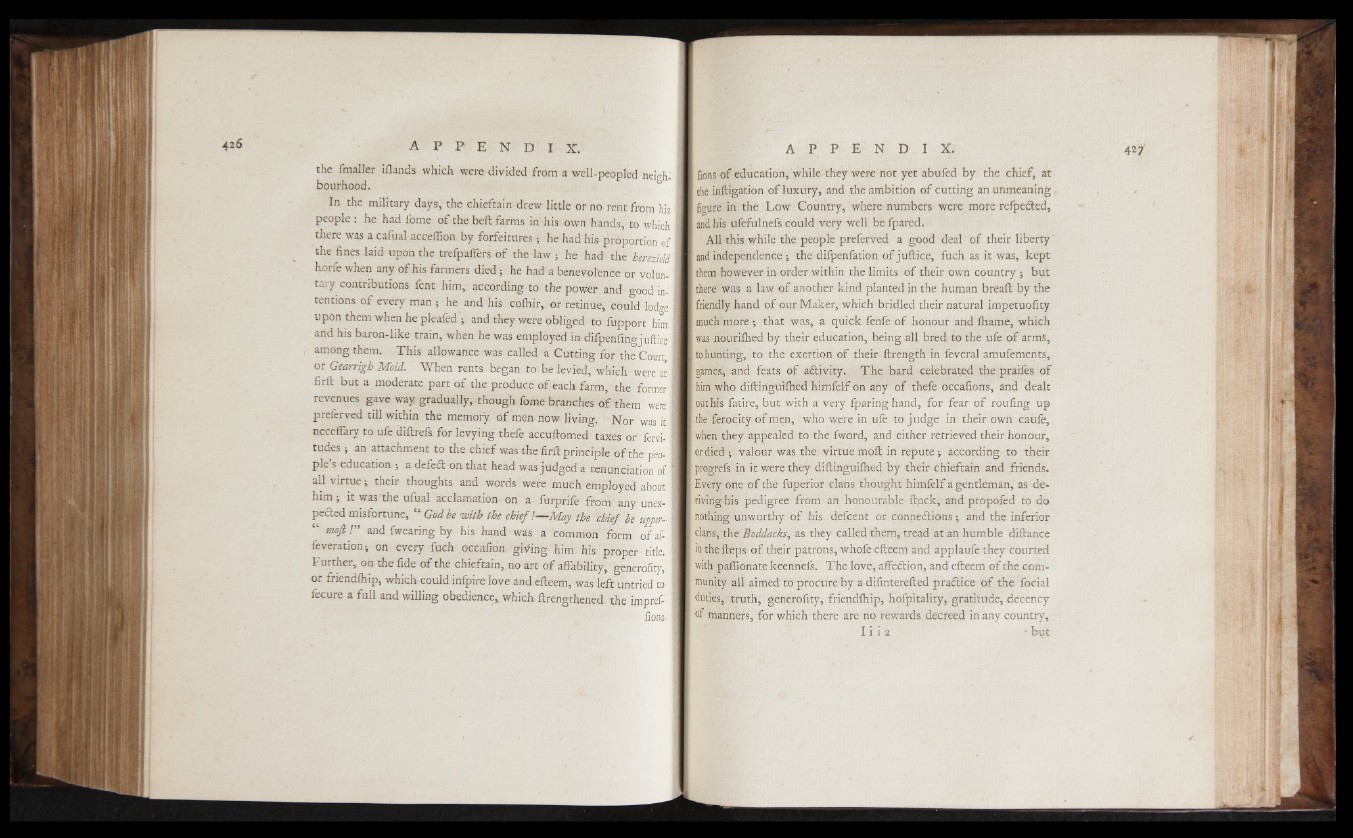
the fmaller ifland's which were divided from a well-peopled neighbourhood.
In the military days, the chieftain drew little or no rent from his- ■
people : he had fome of the belt farms in his own hands, to which I
there was a cafual acceffion by forfeitures y he had his proportion of
the fines laid upon the trefpaffers of the law ; he had the herezield]
horfe when any of his farmers died; he had a benevolence or voluntary
contributions fent him, according to the power and good intentions
of every man ; he and his cofhir, or retinue, could lodge-
upon them when he pleafed ; and they were obliged to fupport him
arid his baron-like train, when he was employed in difpenfingjuftice I
among them. This allowance was called a Cutting for the Court
or Gearrigh Moid. When rents began to be levied,. which were at
firft but a moderate part of the produce of each farm, the former
revenues gave way gradually, though fome branches of them were
preferved till within the memory of men now living. Nor was it
neceffary to ufe diftrefs for levying thefe accuftomed taxes or fervi-
tudes ; an attachment to the chief was the firft principle of the people’s
education-; a defed: on that head was judged a renunciation of
all virtue; their thoughts and words were much employed about
him; it was the ufual acclamation on a furprife from any unexpected
misfortune, “ God be -with the chief /— May the chief be upper-
“ mofi!” and fwearing by his hand was a common form ofaf-
feveration; on every fuch occafion giving him his proper title.
Further, on the fide of the chieftain, no art of affability, generality,,
or friendfhip, which could infpire love and efteem, was left untried to]
fecure a full and willing obedience, which ftrengthened the imprefiions
Cons of education, while they were not yet abufed by the chief, at
the inftigation of luxury, and the ambition of cutting an unmeaning
figure in the Low Country, where numbers were more reipedred,
and his ufefulnefs could very well be fpared.
All this while the people preferved a good deal of their liberty
and independence; the difpenfation of juftice, fuch as it was, kept
them however in order within the limits of their own country ; but
there was a law of another kind planted in the human breaft by the
friendly hand of our Maker, which bridled their natural impetuofity
much more ; that was, a quick fenfe of honour and ihame, which
was nouriihed by their education, being all bred to the ufe of arms,
to hunting, to the exertion of their ftrength in feveral amuiements,
games, and feats of adrivity. The bard celebrated the praifes of
him who diftiriguifhed himfelf on any of thefe occafioirs, and dealt
out his fatire, but with a very fparinghand, for fear of roufing up
the ferocity of men, who were in ufe to judge in their own caufe,
when they appealed to the fword, and either retrieved their honour,
or died ; valour was the virtue moil in repute ; according to their
progrefs in it were they diftinguiihed by their chieftain and friends.
Every one o f the fuperior clans thought himfelf a gentleman, as deriving
his pedigree from an honourable ftock, arid propofed to do
nothing unworthy of his defcent or connedrions ; and the inferior
clans, the Boddacks, as they called them, tread at an humble diftance
in the fteps of their patrons, whofe efteem and applaufe they courted
with paffionate keennefs. The love, affedrion, and efteem of the community
all aimed to procure by a difinterefted praftice of the focial
duties, truth, generofity, friendlhip, hofpitality, gratitude, decency
of manners, for which there are no rewards decreed in any country,
I i i 2 - but